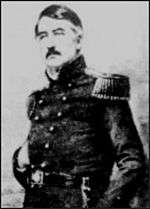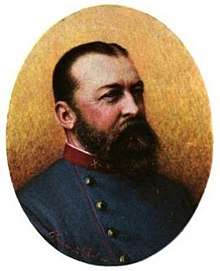Timothy Andrews (general)
Timothy Patrick Andrews (1794 – March 11, 1868) was an Irish-born, career U.S. Army officer. He served as Paymaster General of the Union Army during the American Civil War.
Timothy Andrews | |
|---|---|
 Timothy Patrick Andrews | |
| Born | 1794 Ireland |
| Died | March 11, 1868 (aged 73-74) |
| Place of burial | |
| Allegiance | United States of America Union |
| Service/ | United States Army Union Army |
| Years of service | 1814–1864 |
| Rank | |
| Commands held | Regiment of Voltigeurs and Foot Riflemen Paymaster-General of the United States Army |
| Battles/wars | War of 1812 Mexican–American War American Civil War |
| Relations | Col. Richard Snowden Andrews (son) Col. Charles Marshall (son-in-law) |
Personal life
Timothy Patrick Andrews was born in Ireland, the son of George and Elizabeth Andrews. Along with his father, he immigrated to the United States in 1798.[1]
Andrews and his wife Emily Roseville Andrews children:
- Richard Snowden Andrews, who fought for the Confederate States of America
- Emily Andrews first wife of Colonel Charles Marshall CSA

Career
Andrews' military service began in 1814, when he served as an aid to Commodore Joshua Barney during the War of 1812. He served as a paymaster in the Army from 1822 to 1847.[2]
During the Mexican–American War, he was put in command of the Regiment of Voltigeurs and Foot Riflemen. His second in command, Lieutenant Colonel Joseph E. Johnston would go on to become one of the most senior general officers in the Confederate States Army during the American Civil War. He was distinguished for bravery at the Battle of Molino del Rey, and was brevetted brigadier general for conspicuous gallantry at the Battle of Chapultepec, where his regiment led the assault on Chapultepec Castle.[3]
After the Mexican War Andrews returned to the pay department of the Army, gradually rising in rank. In late 1851 Andrews was promoted to Deputy Paymaster-General[4] and in September 1862 became Paymaster-General of the United States Army.[5]
Andrews retired from military service on November 29, 1864.[6]
Death
Andrews died on March 11, 1868, at the age of 75[7] and was interred at Rock Creek Cemetery in Washington D.C.[8]
See also
- Battle of Chapultepec
- List of U.S. Army, Navy, and volunteer units in the Mexican–American War
- List of American Civil War brevet generals (Union)
References
- Richard Snowden Andrews: A Memoir, Pg. 15
- Marquis Who's Who, Inc. Who Was Who in American History, the Military. Chicago: Marquis Who's Who, 1975. P. 13 ISBN 0837932017 OCLC 657162692
- Richard Snowden Andrews, A Memoir, Pg. 18
- Journal of the Executive Proceedings of the Senate of the United States of America, Pg. 359
- Richard Snowden Andrews, A Memoir, Pg. 24
- The War of the Rebellion: A Compilation of the Official Records of the Union
- New York Times Obituary of Col. Timothy P. Andrews
- Timothy Andrews at Find a Grave